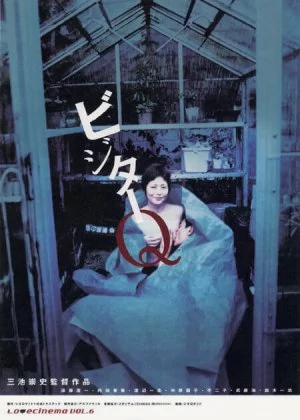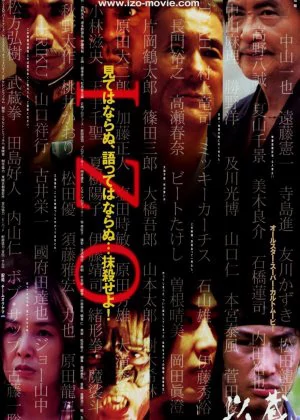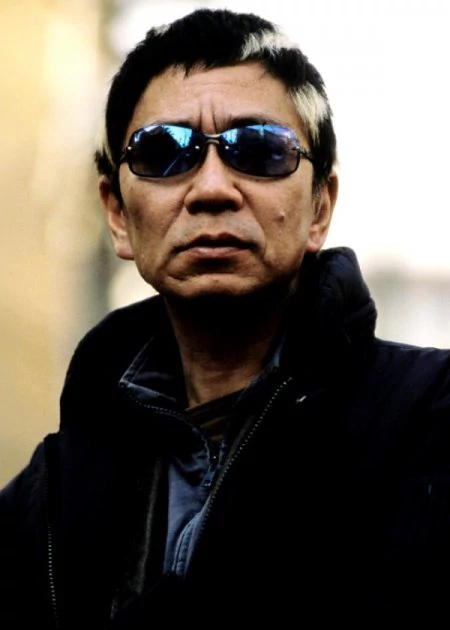
Japan's ultimate bad boy. Takashi Miike doesn't restrict himself to genres, budgets, or audiences and loves to think outside of box. An essential figure in the rise of Asian cinema that characterized the early 00s, but still going strong to this very day.
Movies
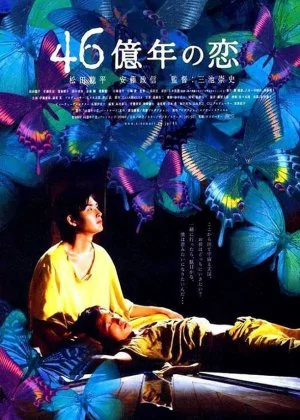
If you want a more experimental and serious side of Miike, this film comes recommended. The film has its share of weird moments, but all the weirdness does seem to serve a higher, more artistic goal.
You do have to be open to Miike's disturbing sense of humor and forgiving for its technical flaws, but once that is covered Visitor Q is one of the most hilariously funny films out there.

Yakuza Apocalypse is the kind of Miike I adore. The film looks good, sounds good, is stacked with crazy ideas and even weirder characters and dares to cross the line of common sense more than once.
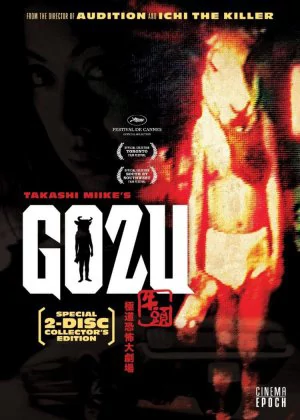
Don't expect a typical horror/mystery flick (despite many claims of Lynch-like scenes), Gozu is a superb comedy meant for people who like their slice of cinema a little crazy and different from the norm.
I've seen Izo three times now and the film keeps impressing me, it's a superb mix of genre film making and arthouse cinema, an unlikely mix that we might never see again in this form.

Vintage Miike with bazookas and manga-like jumps, crazy Yakuza gangs, and a complete disregard for the normal. There is nobody like Miike when it comes to cranking out entertaining films.
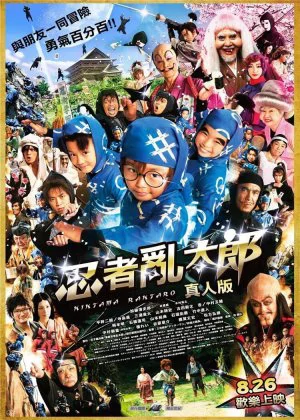
Ninja Kids!!! is the perfect example of demented Japanese kids entertainment that's weird enough to appeal to adults, at least those with some memories of their lost childhood.
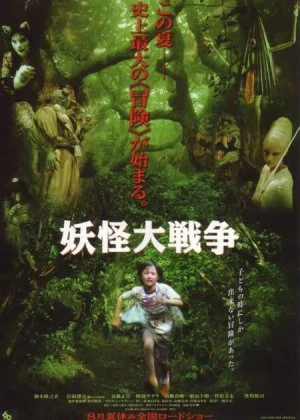
The Great Yokai War was Miike's first venture into big budget cinema aimed at a younger audience.

As the Gods Will is a typical Miike flick in the sense that it's pretty much pointless to compare it to other films out there.
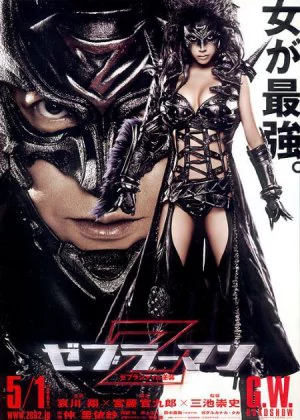
Zebraman 2 is not all that easy to recommend. Depending on what you expect or demand from a sequel, it's either a missed opportunity or a definite improvement over the first film.
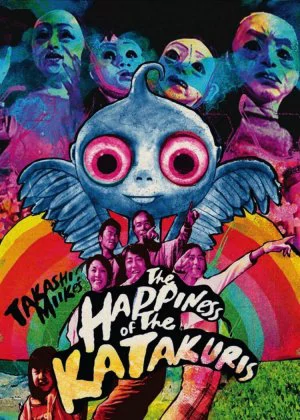
Miike does musical meets comedy meets claymation, it's no surprise then that the result is extremely amusing. While in fact a remake of a South-Korean film, Miike's style is so unique that it's hardly worth comparing both films. It's not one of Miike's finest films, but definitely worth seeking out when you're in the mood for something different.
JoJo's Bizarre Adventure: Diamond Is Unbreakable
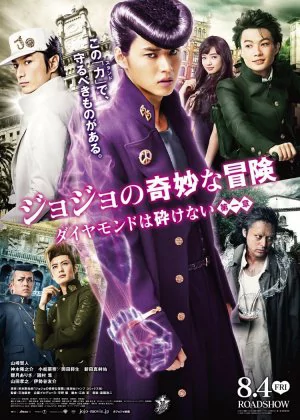
Miike adaptation of the famous manga/anime franchise. For a Miike film pretty slick and commercial, for a commercial film pretty outragous and out there. JoJo is a fun, creative and original superhero film, the kind that Marvel and DC seem incapable of making.
The Mole Song: Hong Kong Capriccio

Starts where the first one left off. More crazy Miike antics wrapped up as a Yakuza comedy. It's not his most insane work, but there's some seriously random stuff in there that's sure to turn some heads. Extremely entertaining from start to finish, might as well make it into a full-blown trilogy.
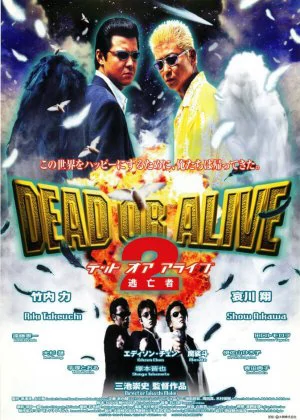
Dead or Alive 2: Birds is an important step in Miike's progression as a director. It's a well-rounded film, one that works as a drama as well as a crime flick.
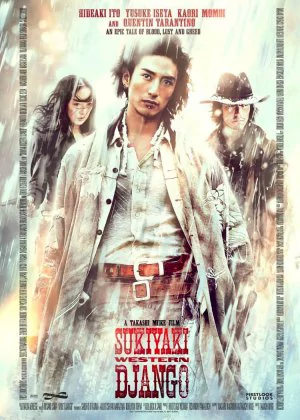
The mash-up between samurai and western universes isn't exactly new, but leave it to Miike to turn it into something completely unique. Apart from the Japanese actors struggling with the English dialogue and a less than stellar cameo from Tarantino, this a vintage Miike ride that delights from start to finish.
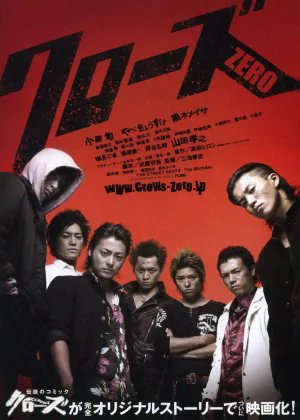
The film never slacks and even gives the viewer a nice look into the whole gang structure in between the fights, making it a little more than just another butt-kicking action flick.
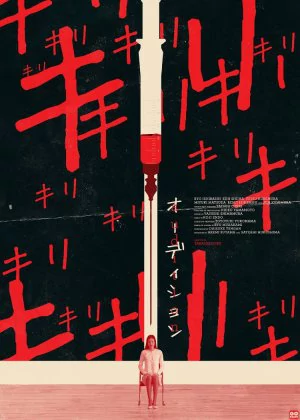
Even knowing how everything pans out, fully aware of how Miike structured his film for maximum impact, this one still managed to impress a second time around. With Audition, Miike proves he can channel his crazy and deliver a meticulously paced film, building up to an amazing, extremely memorable finale. And when Eihi Shiina finally breaks out into gleeful bursts of kiri kiri, it's simply impossible to deny the quality put on display here.

That said, there is still plenty to enjoy here. It seems that with each new film Miike raises the bar on production level. For Love's Sake looks absolutely stunning, from start to finish.
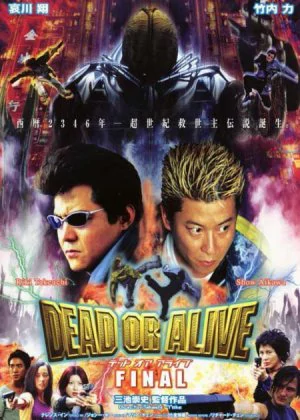
A great way to end a totally bonkers trilogy. Aikawa and Takeuchi return put an end to their endless fighting, this time in a futuristic version of Hong Kong. There are some great action scenes, some solid dramatic interludes and a couple of vintage Miike moments. Fans of the series won't be disappointed, others do best to watch part one and two first.
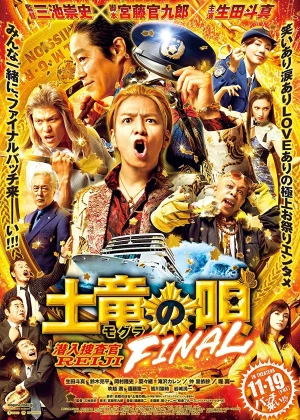
Miike's third and final part in the Mole Song trilogy. I really liked the first two films, this third one is by and large on the same level as the second. Miike isn't quite as edgy as he used to be, but this film is still pretty out there. Silly comedy, over-the-top situations, some vintage Miike wackiness, and a bunch of familiar faces make the two-hour runtime fly by. I don't understand why these films haven't been picked up for a Western release yet, but with the series done and dusted now, it's the ideal moment to release a neat box set. This was a lovely finish to a great series.
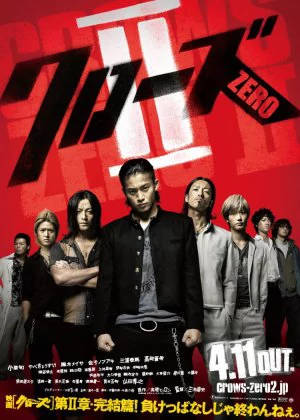
Crows Zero II will probably appeal to the people who liked the first film and can bear a second, almost identical, serving.
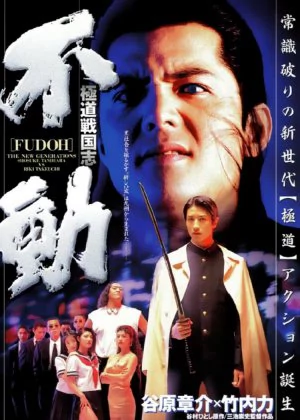
The film that introduced international critics to the wonderful world of Takashi Miike. Fudoh is a Yakuza epic sprinkled with inventive ideas, weird characters and grotesque kills. It's one of Miike's earlier films, meaning the stylistic finish is quite rudimentary and the pacing is all over the pace. But there are so many memorable moments, so many scenes you won't see from any other director, that it still manages to amaze 25 years after its release.
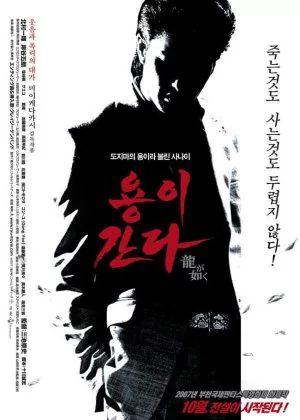
A lesser known Miike, but that doesn't mean it's less fun. One of his last Yakuza-themed films, but don't expect anything too serious. The film is loosely based on the Yakuza game franchise and is a hoot from start to finish. Action, crime, comedy, a few typical Miike moments. Not his best work, but still worth a look.
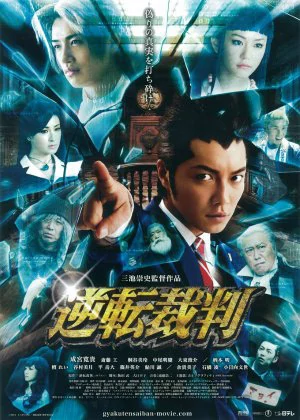
Ace Attorney is a Miike blockbuster. The weirdness is kept to a minimum, but the entertainment value is high and the film definitely has its moments of brilliance.
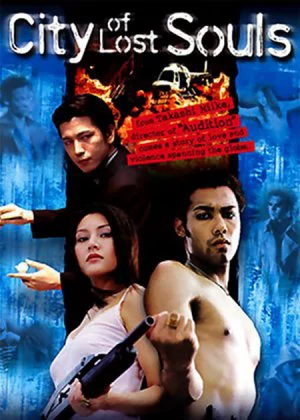
It doesn't ruin a film like The City of Lost Souls, but it does take away part of the appeal. There's still plenty of fun to be had with this film though.
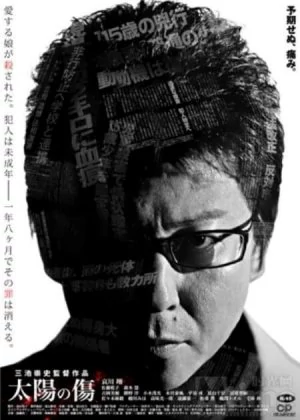
Part drama, part subdued revenge, which a big finger pointing at the passive attitude of many instances and people in this film, the film impresses until the very end.
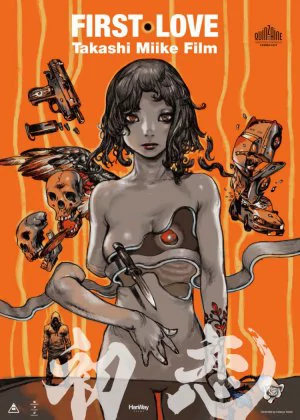
Slightly disappointing, especially considering all the hype. The film feels a little tepid and too streamlined for a Miike film. There isn't enough craziness, there is too much focus on plot and it's just a little monotone. It's not a bad film really, but within Miike's oeuvre it is quickly eclipsed by much better films.
That Moment, My Heart Cried
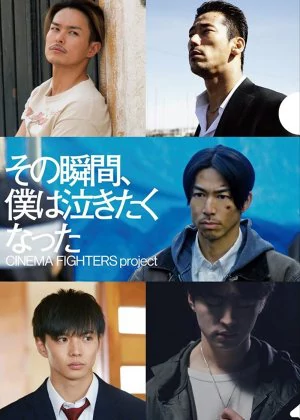
A pretty peculiar anthology. This was marketed as something a bit more experimental, heralding new forms of film making and all that. The result: five pretty basic Japanese drama shorts, some of them with a little fantastical twist, but none of them really doing anything special or out of the ordinary. Miike's short feels like a live action version of a Shinkai film, but the execution is a little flat, the 2nd and 3rd shorts aren't all that remarkable either. Horanai's film is the first to really show some promise, but it's Yukisada's 5th and final entry that finally delivers the goods. It's certainly not a bad collection of films, but I honestly expected more. There are no weak films, but no stand-outs either.Read all

Miike doing a more restrained film. 2018 has been a quiet year for him, with just a single release on the tables. There's still some weirdness of course, but it's the blend of science and fantasy rather than the characters and events that stand out here. Well-made, entertaining and amusing, but not a Miike classic.

My expectations for Blade of the Immortal weren't as big as for other recent Miike projects. The hyped up Miikes are usually a bit tamer (especially nowadays) and his samurai films rarely end up among my favorites (Izo being the notable exception). I was still looking forward to watching it though, Miike is after all one of my personal favorites. Blade of the Immortal isn't a bad film, but it's not a film that screams Miike. No weirdness, no crazy ideas, no what-the-fuck moments. It's a film that could've been directed by just about anyone really, except that's a bit more violent that your average samurai flick. And even that was a little exaggerated. There's a high enough body count, but it's just regular hack & slash action, with people falling down rather quickly. It doesn't get much crazier than a hacked off limb here and there. Again, I can't really fault the film too much, it looks nice enough and even though it's quite long it doesn't drag, but a straight-forward Miike is simply a waste of potential, no matter how good it is.Read all

A film that seems to have slipped by without making too much of a fuzz, which is a bit weird considering it's one of the crazier Miike's of the past decade. It's not an easy sell, I grant you that. At its core it's a sci-fi film, though I doubt it will appeal to sci-fi enthusiasts. Terra Formars is a film for the real Miike fan. Think of it as Power Rangers on Mars, with big, cockroach-like creatures threatening the existence of humankind. An expedition comprised of humans with special powers is sent to protect our planet from these creatures. If that sounds weird or doesn't make it any sense, just remember that you're watching a Miike film. The CG is a bit flaky, but the design are pretty hilarious. The bad guy is badass and even though the morphing stuff can get a little childish, the special powers are at least are quite original. It's a daft film that loses a bit of steam around the halfway mark, but overall there's a lot of fun to be had with this one.Read all

Not the crazy Miike, not the commercial Miike. Over Your Dead Body was made by the solid, more serious Miike. A film that doesn't rely on craziness, wild ideas, over-the-top horror or action. Instead, it's a pretty classic setup that follows a typical structure and shows Miike can also handle simple but quality filmmaking. While I did like the film a lot, I do have to say it feels like wasted potential when Miike does one of these films. Mostly because there are plenty of other directors who could've made something very similar, while nobody is able to do Miike. Especially with a Perfect Blue-like story he could've done so much more, if only he'd approached the film from a different angle. But the intrigue is solid, some light horror moments make it a bit creepier, the sets look nice and the cinematography is on point. The only thing that bothered me was that the pacing was a little sluggish, even so the film was tense enough to keep me glued to my seat. Not the best Miike, but a very solid and entertaining film nonetheless.Read all

A more straight-forward police flick from Miike, in the line of The Negotiator. That means a team of police investigators have about two hours to crack a case, tracking down a mean and twisted killer (played by Fujiwara - not really the most obvious cast, but he does a surprisingly solid job). There's none of Miike's usual (or at least, what most Western fans thinks of as usual) weirdness here, instead it's a pretty slick but simple genre film that goes through the motions with just the right amount of flair. The only real surprise was that the meaningful body count was quite a bit higher than usually the case. Miike 's experience shines through when he's doing simpler films like these, as Shield of Straw appears quite effortless while breezing through its two-hour runtime. Fine performances, decent cinematography, a solid build up and a neat finale make this a very pleasant and easy watch. The best kind of filler you can ask for.Read all

Takashi Miike returns ... once again. There really is no stopping the man, and though not every film is a masterpiece, even his relatively flawed ones can be more than entertaining. Aku No Kyoten is one of Miike's more mainstream efforts, a film that bears the unmistakable stamp of Miike, only in a slightly watered-down and more acceptable fashion. Aku No Kyoten bares some resemblance to Nakashima's Kokuhaku, especially when comparing the setup of both films. Seiji is a teacher with an impeccable moral, always ready to help his students with their more intimate problems. He vows to rid the school of all nasty business, but secretly the man has an agenda of his own. One that is revealed during a sprawling 45 minute finale. The first hour is a bit tame though. There are some quirky characters, but compared to other Miike films they aren't all that interesting. The biggest flaw is no doubt the casting of Hideaki Ito (who plays Seiji), an actor who lacks the charisma and flair to play the character he is supposed to be. With him present some of the better moments of the film miss their target. A real shame, because Miike goes pretty wild during the final 45 minutes. Nothing he hasn't done before, but some of the principal characters go down with surprising ease, something I'm sure not everyone will appreciate. Miike fans will rejoice when the film makes its way to a solid climax though. After a slow start, Aku No Kyoten delivers the goods, even when its main actor lacks the skills to impress the audience. By then it's just a case of too little, too late. It's still a pretty great flick though, but when watching a Miike film I expect a little extra and that's clearly missing here. Read all

Miike's remake of Kobayashi's Harakiri. I wasn't a big fan of that one to be honest, so I was curious to see where Miike would take this film. Turns out he would simply stick close to the original, the biggest difference for me was the more contemporary execution, which had a big impact on the overall experience. Performances and technical qualities are a lot better compared to the original. The score is nice, the cinematography is on point and Ichikawa is an impressive lead. The story is more or less the same, sadly Miike can't keep up the tension all the way through, the middle part in particular is a little too slow. Not quite sure what or if the 3D effect added anything to this remake, personally I can't imagine it made a big difference (it's not really the kind of film for that either). I prefer the crazier Miike films, still it's impressive to see his range. While not spectacular or extremely memorable, Death of a Samurai is a stylish, well-made film.Read all

Miike makes films, regardless of target audiences, regardless of his own reputation. There is nothing he won't do, and the more he tries the more my belief grows that there's literally no genre or niche he can't tackle. Yatterman is a film for younger audiences, but with some typical Miike winks that make all the difference. I'm not familiar with the Yatterman franchise, but I got some serious Pokemon/Team Rocket flashbacks while watching this film. It's really aimed at younger kids, with its very colorful sets and props, over-the-top characters and silly plot, but that doesn't stop Miike from taking it a little further whenever he sees an opportunity (the scenes between the robot and the dog stick out). The CG is a bit too simplistic, while the style doesn't call for realistic CG I felt a little extra polish would've raised the overall quality. It's also quite long considering how little plot there is and if you're looking for something age-appropriate (and you're over 20) than this isn't going to go over well, but damn it's so silly, fun and entertaining that I didn't mind at all.Read all

A slightly disappointing Miike. Not because it's a bad film, but because the potential was there to make something more out of it. It's one of those plots that could've turned into one of the all-time Miike greats, but it lacks the touch of the most inspired Miike to make it really stand out among the many other films in his oeuvre. The story revolves a set of twins, one of which is a hardworking student, the other an aimless loafer. They get mixed up in a scientific discovery that is bound to rip apart the fabric of our reality. Underneath it all lies a simpler romantic plot where one of the twins is trying to woo the girl who made the discovery. The film is roughly divided into two parts. The first hour is mostly there to set up the story, the second hour brings the action and excitement. For once though, I prefer the slower first part, as the latter lacks the outlandish details that are so typical for Miike. It's definitely not a bad film, the film grabbed my attention from start to finish, but it just didn't feel fully realized.Read all
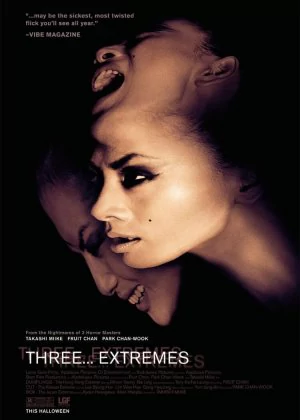
Sequel to the famous horror anthology that repeats the setup of the original and brings together three respected directors from three different Asian countries. Takashi Miike represents Japan, Fruit Chan is there for Hong Kong and Chan-wook Park is the South-Korean delegate. It's also my order of preference. Miike's short is by far the most eye-popping. Though Miike has a reputation for being weird and extreme, Box is quite the opposite. It's a very subdued, stylish and classy short that demonstrates once again there's really nothing Miike can't do. If he had expanded this to a full-length feature, it would no doubt be one of his very best films. Chan's Dumplings is a nasty little short that looks gorgeous (thanks to the help of Christopher Doyle), but works better in its feature-length form. Finally, there's Park's entry, the only big disappointment of this anthology. Not that I expected a lot, but it comes off really bland and uninspired compared to the other two. Still, if you're looking for a neat and varied horror project, you can't really go wrong with this one.Read all

Miike takes a stab at the superhero genre. Don't expect this to be a very serious attempt, this isn't Miike trying to establish an alternative to the MCU (but you could've guessed that from the title). Regardless, he commits to the topic and creates a completely charming superhero, silly costume included. Ichikawa is an elementary school teacher whose life is falling to pieces. His class doesn't respect him, his wife cheats, and his kids are nothing but trouble. The only thing that lifts his spirits is an old superhero franchise called Zebraman. When aliens suddenly invade Earth, Ichikawa decides to take matters into his own hands. Zebraman is a typical Miike in the sense that there are quite a few scenes that stand out, but also quite a bit of filler that drags out the film unnecessarily. The aliens are awesome, the finale is hilarious, the performances are solid. If only the editing would've been a bit tighter, this could've become a true Miike classic.Read all

Miike may be known as a "master of horror", it took him quite a while to jump on the Asian suspense wave. While he loves to experiment with horror elements, he hadn't made a straight-forward ghost flick before he gave it a go with One Missed Call. The result is a solid genre flick, though without the usual Miike touches. One of Yumi's friends receives a message on her cell phone, sent from her own number, dated three days into the future. When she plays the message, she hears her own death scream. Three days later, she dies, a little after that her friends get the same message. Yumi is freaked out and decides to investigate the matter. The setup of the film is pretty predictable, and it takes Miike a bit too long to get to the crux of the matter. Once all the pawns are in place, the film gets better. An extended scene in an abandoned hospital shows that Miike has the chops for this type of less-is-more horror, there just isn't enough of it to make One Missed Call a true Miike essential. Still, a great choice if you're looking for fun horror filler.Read all

The first part of the Man in White two-parter. The Man in White is a vintage Miike Yakuza epic. That means the violence is raw and crude, the characters are plentiful, and their relations are complex. Don't expect a very action-packed film, but a more detailed peek into the world of the Yakuza. Azusa is a spectator to the murder of his boss, what makes things worse is that the killer is Azusa's own brother. Though blood runs deep, his ties with the Yakuza run deeper and after his brother escapes, he vows to avenge his boss' death, even if that means chasing and killing his own brother. The Man in White isn't unlike Agitator. It's a rather slow film that features a big cast, takes its time to introduce everyone, and starts unwinding its plot slowly and deliberately. This is a true Yakuza/crime film without all the frills and cool of more entertaining genre efforts, but that doesn't make it any less interesting.Read all

If you haven't seen too many Miike films yet, this one might come as quite the surprise. The Negotiator is an extremely polished, sane and structured film, one that sticks very neatly to genre conventions and colors inside the lines. Miike goes full for execution here, the coolest thing is that he actually manages to pull it off. After a heist, three masked men flee into a nearby hospital, taking more than 30 patients and doctors hostage. The police are stumped and call in the help of Maiko Tohno, a professional negotiator. The only problem is that she has to work together with inspector Ishida, her former husband. No crazy characters, no baffling moments, no typical Miike moments. The Negotiator mixes drama and crime elements and offers a detailed narrative that unravels the rather complex story bit by bit, without ever skipping a beat. Performances are decent, and the film looks polished, so if you love a good negotiator flick, or you want to look beyond Miike's more celebrated film, this comes warmly recommended.Read all

One of Miike's quality Yakuza epics. Shorter and less confusing than Agitator, but very much in the same vein. That means Miike keeps the crazy out of it, instead focusing on the characters and their somewhat intricate web of relationships. Yakuza Demon brings crime cinema with limited action elements, one for the hardcore Yakuza fan. Seiji, Yoshifumi and Muto form a small clan within the Date family. They're a very tight group, but when the Date group get tangled up in a big conflict with competing families, de Muto clan is appointed to clean up their mess. Reluctant, they oblige, knowing they at least have their own back at all times. Quite a few Miike familiars here, with a spectacular Riki Takeuchi spearheading the film. The characters are pretty interesting, the action scenes are intense, and the Yakuza conflict offers the necessary drama. The film also features a pretty remarkable soundtrack, which is certainly not the norm with Miike films. Good stuff.Read all
Deadly Outlaw: Rekka

Miike can do serious crime cinema pretty well, but a small problem arises when he tries to combine it with his wackier stuff. Between all the crazy and madness, these serious moments quickly start to feel out of place, as if they're holding the film back. This is exactly what happened with Dead Outlaw: Rekka. Kunisada is spending time some in prison after helping out the Sanada family. His successor in the Sanada clan is brutally murdered, seemingly by the rivaling Otaki gang, yet Kunisada finds out it's all part of a ploy to get him out of the picture. When he gets released from prison, it's time for Kunisada to take revenge on his former gang. Riki Takeuchi is born for parts like these. He's rough, violent and energetic, a vibe that Miike enhances by giving him some cool, funny and batshit crazy moments. These are the standout moments, what comes in between is far less exciting. A bit too much of the usual gang drama messes with the pacing of the film, but there are still plenty of memorable moments left. Solid Miike.Read all

Miike's darkest take on the Yakuza genre. The first half of the film is a pretty standard Yakuza tale. A lot of characters are introduced, there's some muscle flexing and intrigue, and the rise and fall of a young recruit. Nothing too out of the ordinary, but Miike does well with that kind of material. It's the second half that makes this one stand out. This film is Goro Kishitani's moment in the spotlights. His character is dark, depraved and impossible to like, yet Miike makes him the emotional centerpiece of the story. It's not a film for people who want to see a fun Yakuza flick, nor a film for people who want 2 hours of wacky Miike. It does lack the polish to be one of his all-time bests, but it's a very worthy film indeed.Read all

If you think Miike can only do weird and extravagant, it means you simply haven't seen the right films yet. Sabu is a somewhat inconspicuous entry in Miike's oeuvre, but that doesn't mean it isn't worth seeking out. It's a sweet and genuine samurai drama/romance with some rougher moments spread throughout. Tatsuya Fujiwara's performance is strong, the pacing is lovely, and the cinematography and score are proper (though they're not quite top-of-the-line, which is where the film does lose some points). I loved the film the first time I watched it, having seen so many other films in between it has lost some of its charm, but it's still a worthy film, even (or maybe especially) when you're not a Miike adept.Read all

Miike shows a softer side with Shangri-La. As is often the case, the titular Shangri-La isn't a literal paradise, but it's certainly not a cynical or ironic one either. Miike delivers a pleasant and agreeable little drama about a secluded community of outcasts. The film tones down any excess and aims for comfort instead. Sho Aikawa plays the leader of a small community of homeless people. They have little wealth, but they also have few problems, and they live a happy life under Aikawa's command. When a broke printer joins the gang, they take pity on the man and devise a plan to save his business. Aikawa is clearly the star of the film. The rest of the cast is a quirky bunch, the plot is predictable but amusing and even though it's not as distinctive as some of Miike's other films, it's a testament to his talent that he can easily pull off a film like this too. Very sweet and agreeable filler.Read all

If you like hardcore Yakuza flicks, this is the one Miike you should watch. In the West most people aren't too familiar with this side of Miike, fans of Yakuza films on the other hand know that Miike can direct a mean crime flick. This is probably his longest and most detailed one, carried by an amazing duo. The actions of a loose canon cause a big Yakuza war. Egos are hurt, bonds are inevitably broken and takeovers are on everybody's mind. In this broad power struggle, a small group is trying to keep alive and come out the winners, but they have enemies in every rank and survival is near impossible. Mickey Curtis and Naoto Takenaka are both excellent. The presentation is relatively dim and uninteresting, but the strong performances, the detailed depiction of the power struggles and the overall coolness make this a very worthy crime epic. Not quite my type of film, but in its niche one of the better ones I've seen.Read all

Ichi the Killer is one of Miike's most monumental films and a true landmark in his oeuvre. Its qualities are unmistakable, for me though, it's never been a top tier film. There are undeniable moments of greatness here, scenes and characters that are extremely memorable, even helped define the 00s, there's just a little too much filler for my liking. The cast is superb, but it's Tadanobu Asano who stands out as Kakihara, no doubt one of the pivotal roles in his career. The film is quite extreme, very graphic and well over-the-top, that said that it's never quite as crazy or surprising as some of Miike's other films. It also slows down too much in the middle, which hurts the overall pacing. That said, there's no way around this one if you care for Japanese cinema. Regardless of it's minor faults, this is still an insane film and a true must-see in Miike's oeuvre.Read all

Another more modest Miike film. Fans of the man's work will recognize this as a typical Miike drama (strong foreign influences, solid performances, a slightly unpredictable plot). Just don't expect to find any of Miike's zany and excessive elements here, you're only setting yourself up for disappointment. During his vacation in the Philippines, Kohei is unfairly charged with drug possession. His girlfriend ditches him immediately and Kohei ends up in prison. His situation appears to be hopeless, until he meets Katsuaki. He promises to help Kohei escape, if Kohei in return teaches him about being a good businessman. The setting is refreshing, the Philippine prison system is pretty baffling from a Western perspective. Miike builds up the story and characters pretty well and makes sure the film never becomes too complacent. A strong finale, with an impressive Endo, is the icing on the cake. Solid Miike that shows he can do so much more than his trademark weirdness.Read all

Dead or Alive was the very first Miike film I watched, it was also the first real Yakuza film I watched. I was expecting something very different at the time, so I remember being quite disappointed. Apart from the beginning and ending, nothing really stood out for me. It's a good thing I revisited the film, so many years (and Miike films) later this was a lot easier to swallow. Dead or Alive really means Aikawa and Takeuchi. They're the stars of these films, and they handle the sudden bouts of weirdness and violence with surprising grace. The start and the finale remain the clear highlight of the film, but in between there's some vintage Miike moments and some pretty cool crime elements. Bold and in your face, Miike was clearly starting to start his voice here.Read all

Ley Lines is the third and final entry in Miike's Black Society trilogy. It's a trio of films where Miike combines his more outrageous characteristics with a stronger focus on plot, characters and styling. For people who tilt more to the arthouse side of cinema, this is definitely one of the Miike's to prioritize. Three Chinese-born kids leave the Japanese countryside to explore the much livelier metropole that is Tokyo. Once there, it starts to dawn on them that the reality of a big city is a lot different from what they imagined. Jobs are scarce, and it doesn't take long before they end up in the shadier parts of town. There are still plenty of vintage Miike moments, but they're slightly more subdued, and they fit in better with the rest of the film. Performances are good, the cinematography is above par and the drama works well. Ley Lines is a perfect gateway into Miike's oeuvre for people who prefer a more consistent film experience, without having to miss out on Miike's signature moments.Read all

Miike is no stranger to a bit of experimentation, and he certainly isn't scared to venture outside his comfort zone, but rarely did he try to do so much in the span of a single film. Andromedia is like watching several films rolled into one, which makes this a film for the more adventurous Miike fan. When Mai dies in a traffic accident, her father figures out a way to download her conscience onto his computer, where she can live on until the end of times. An ill-meaning businessman finds out about this technology and wants to steal the software, but Mai is connected to the program and her father doesn't want to lose her a second time. There's romance and coming of age drama, thriller and action elements, a thorough sci-fi ending. There's also Miike's trademark comedy and even a little music video intermezzo in the middle. It's certainly not Miike's most consistent film, he'd also improve on every element in his film in his later work, but it's such a wild ride that I'm pretty certain Miike fans will get a kick out of it.Read all

A fine mix of crime and drama, where Miike is allowed to showcase his versatility. It's a film that would've felt at home in the Young Thugs trilogy, but it stands well enough on its own. It did feel slightly less special watching it again 15 years later, having seen more films along the same vein. The performances are solid, Miike's direction is playful and the pacing is slick. Blues Harp shows that Miike doesn't need all the weirdness and quirk to make a good film, on the other hand, he has a tougher time distinguishing himself from other directors working in the same space. Not one of Miike's all-time classics, but a pretty lovely film regardless.Read all

This is one of Miike's more serious efforts. If you lean more to the arthouse side of cinema, and you've been wanting to sample some Miike films, this is a pretty good place to start. Miike's usual excess is toned down but not entirely absent and the second half does show a more mature, restrained side of Miike that's missing from his more popular films. A Japanese businessman is sent to China, where he is tasked to screen a possible jade deposit. He is joined by a Yakuza member who has to make sure the man does his job. The trip to Yun Nan is long and perilous, and while the two can't really stand each other, a bond does begin to form. Watching the shifting dynamics between the characters is interesting, the setting is beautiful, and the second half is surprisingly restrained and stylish. The film looks a bit murky though, with colors that don't pop enough to do justice to the beauty of the Chinese countryside. A digital restoration might restore some of its former glory, but the core qualities are still there. A very good Miike, that stops just short of being a personal favorite.Read all

Many older Miikes have trouble staying afloat. Films like Nostalgia are not bad, it's just that they're not quite refined and polished enough to survive multiple watches, certainly not with a lot more Japanese films under my belt. Still, if you only know Miike as a madcap horror director, Young Thugs: Nostalgia is an absolute must. The mini-Yakuza world is fun, the drama is a little edgier than usual and there are one of two vintage Miike moments, but it's a pretty standard drama beyond that. And for that, the pacing, the aesthetic, and the performances just aren't strong enough. A fun film, well worth watching, but not good enough to remain a personal favorite.Read all

A combination of Miike's Yakuza cinema and Robocop. It's certainly a fun take on the more serious Yakuza cinema, and it allows Miike to go wild with some of his wackier impulses. The budget isn't really there though, so you have to be able to forgive the film some cheesier/less refined moments. When a Yakuza goon is gunned down, a mad professor finds his body and uses it for his experiments. He brings the man back to life, transformed as an almost invincible cyborg. Remembering the people who killed him and his boss, the reborn Yakuza plans his sweet revenge and sets out to kill some people. If you like fun Miike, you're going to love this film. He doesn't really go full-out, but the mix of action, crime and signature Miike weirdness is just extremely pleasant and so very easy to stomach. The film isn't too long, there are plenty of memorable moments and the performances are solid. Just look past the shoddier effects, and you're sure to have a blast with this one.Read all
Young Thugs: Innocent Blood

Not quite as good as its sequel, but still a worthy Miike. He gets to focus more on the drama in this film, though there are still some signature Miike moments that make sure you won't mistake the director pulling the strings. The film feels like a work in progress (which it probably was), with Miike trying to balance out different genres. Three teens decide to end their school life by clubbing their teacher with a flowerpot. When the teacher's down, they steal his money and they each go their own way. Ryoko lands well and finds a job as a hairdresser, the other two fair quite a bit worse and end up joining a local Yakuza gang. Despite all the drama and the lengthier runtime, Miike manages to keep it light and breezy. The focus may be the characters and the drama surrounding their transitioning into adulthood, some excess violence and weird comedy will remind you that this isn't just a basic Japanese crime drama. A solid Miike, but not quite up there with his best.Read all
The Way to Fight

A film that probably works better when watching Miike's work chronologically. The Way to Fight feels like a precursor to the Young Thugs films and his Crows Zero work, a mix of micro-Yakuza crime and coming of age cinema. It's not as refined as these later Miike's, but still quite a bit of fun. Kazoyoshi and Takeshi are the top fighters of their respective high schools. To determine who is the best fighter of the two, a special bout is organized. When the time is finally there, the two seem to be missing each other every time they want to meet up. When they do finally get together, a big brawl is about to go down. Not quite as mad as Miike's later films, not quite as ambitious either and with a runtime of nearly 120 minutes, the film does lag just a little. But there's still a lot of fun to be had with this one. Miike's quirkiness is already present, performances are decent, and the film oozes love for cinema. It's a stepping stone to Miike's future masterpieces.Read all

One of the first true Miike films. Osaka Tough Guys is a Yakuza/crime flick littered with vintage Miike weirdness. So much in fact that it reminded me a little of Kitano's Getting Any. After a short introduction, the film switches to a sketch-like setup with very little in the way of an overarching story. It is pretty funny though, so I can't say it bothered me. The presentation of the film is pretty crude, and so is the comedy for that matter. But Miike shows things no other director would even dare to dream of, and the combination of classic Yakuza elements and zany/borderline absurd comedy makes this a very easy watch. It's not a true Miike classic, but it's an essential step in his career, one that would foreshadow the greatness to come.Read all
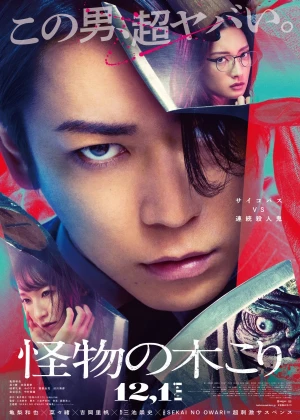
The prospect of Miike releasing straight to Netflix is quite appealing, but it's been a while since he released a "true" Miike film. Lumberjack the Monster is a decent, proper slasher, but it's a film that could've been made by a number of other directors, and in Miike's case, that's a waste of potential. The production is slick, there are some bloody scenes and a handful of memorable moments. But the film is too long and there's a bit too much talking. The mystery elements aren't all that interesting and the film lacks anything that sets it apart from similar works. A solid, but ultimately forgettable Miike.Read all

Not Miike's finest hour. I rewatched the first film not too long ago, and that one still held up pretty well. This sequel shares many of the same traits, but seems more exclusively targeted at a younger audience. There is still some fun to be had, but those typical Miike-only moments are missing, which just leaves a more kid-friendly version of the first part. The CG is a bit iffy, the new yokai don't feel quite as distinct and the performances of the kids aren't all that great either. There's still some general wackiness and the "yokaiju" idea is pretty fun, I just expect more from a Miike film than mere throwaway entertainment. It's certainly not his worst film, just a tad disappointing.Read all

A typical Miike in the sense that this is something he hadn't done before. The Lion Standing in the Wind is in essence typical Hollywood schmaltz. Drama cinema with a conscience, though not afraid to throw a little extra cheese on top. The film is a good step better than some of its more offensively sentimental peers, but Miike fans would do well to adjust their expectations before tackling this film. Koichiro is a Japanese doctor who moves to Kenya to help out in a hospital that treats child soldiers. The circumstances there are dire and Koichiro is eager to make an impact. He has quite a bit of trouble adjusting to life in Kenya though, and he finds himself on the verge of abandoning his mission. Thing change when he connects with a new patient. No doubt the film is a little neater and more romantic than the story it was based on, but Miike makes sure it doesn't become too saccharine. Performances are solid, the scenes with the Kenyan kids are pretty endearing, and the drama is respectable. Not his greatest work, but far from the disaster I'd feared when I first heard about this film. Read all

A bit boring for a Miike. Thirteen Assassins isn't a bad film and if you watch the longer cut you'll be sure to see some trademark scenes and characters, but other than that this felt a bit too much like watching an updated Seven Samurai. Fine if that's your thing, but you don't need someone like Miike to waste his talents on a film like that. It does explain the film's high critical acclaim though. The leader of the Akashi clan is about to get a big promotion. He's not the nicest leader though, having raped and plundered many villages in the area. Thirteen samurai gather to put on an end to his reign, before he's too high up the chain. They set off on a suicide mission, with just one single goal: kill the leader of the Akashi clan. The first hour is quite slow. It isn't until the thirteen start their journey that the film picks up some speed. The lengthy finale is quite action-packed, but the choreography is very samey and not all that exciting. The longer cut does have some quirkier characters and crazier moments, just not enough to make this a standout Miike film. It's a decent introduction into his oeuvre though, especially for fans of hack and slash samurai action. Read all

It's no secret that Miike's work can be a little inconsistent. Detective Story isn't a bad film, but it does feel like a filler project, something to do in between bigger films. In that sense, there's certainly some fun to be had with this one, just don't expect a landmark Miike classic, unless you want to set yourself up for disappointment. When Raita moves into his new apartment, he finds himself living next to a private detective with the same name. Not long after, one of the detective's clients is found dead, missing a kidney. The two start an investigation together, which leads to a peculiar painter, who is said to use human blood and organs for his paintings. The film does have some odd scenes and characters, but mostly in contrast with the rather stark detective plot. It's enough to keep you on your toes, but that's about it really. The cinematography is murky, performances are forgettable, and the finale is nothing out of the ordinary. Solid Miike filler, but still oddball enough to deter unsuspecting audiences.Read all

Miike's entry in the Masters of Horror anthology. This film was kept out of the TV run as it was deemed a bit too hardcore, but horror/Miike fans better keep their expectations in check. Though it does feature some freaky bits, it's hardly a film that stands out for its excess. There are some other notable elements though, sadly, not all of them are positive. Christopher is an American journalist who met the woman of his dreams years ago in Japan. He can't get her out of his head and so he returns to Japan, hoping to track her down. It's a quest that leads him to some questionable brothels, and he'll soon enough discover that his former sweetheart has a pretty dark secret that will make their reunion trickier than expected. Just like Sukiyaki Western Django, the film suffers from horrendous English-language dialogues. It's not just the Japanese actors to be fair, Billy Drago too is simply insufferable. It's a real shame, as the horror bits are delightful and the plot is interesting enough. It's a pretty cool film, as long as you don't miss too much due to all the flinching you'll be doing. Read all

Not every Takashi Miike film is a celebration of weirdness and originality. Waru (a manga adaptation) is one of his more inconspicuous features. It has the feel of a filler project, something Miike made in between more prestigious films. It's not a total fluke, fans are sure to recognize some flashes of Miike's talent, but it's probably best to keep your expectations low for this one. Yoji, a lower ranking member of a Yakuza family, ends up in prison after picking a fight with another gang. There he becomes good friends with one of his fellow inmates, but when his newfound friend is released from prisons he quickly returns to his former life of crime. By the time Yoji regains his freedom, his friend is already dead and buried. Of course, Yoji won't rest until he gets his revenge. Waru has a pretty basic setup and Miike isn't too bothered with giving the film some extra appeal. Aikawa's performance is on point, there are a couple of inspired moments and the pacing is perfect, but overall it's a pretty generic genre flick that sticks to conventions and tries to go from A to Z as smoothly and effortlessly as possible. Solid filler in other words. Read all
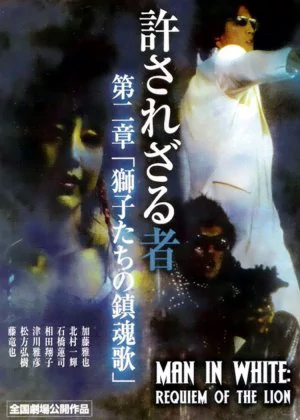
One of Miike's final DTV releases. A sequel to The Man in White (released in the same year), which I remember liking a little better (although I'll be honest, I'm mostly going by my own ratings here, I don't remember that much from the first film). Not too surprising, because this is pretty basic Miike stuff. Part 2 is also a full-blown Yakuza film. The usual themes of honor and revenge are abundantly present, you won't miss out on the usual Yakuza shouting, gun action, finger clipping and whatnot either. Miike is more than capable to make these types of films work and that's exactly what he does, without putting in excessive effort. The film looks okay, but it's nothing special. From time to time Miike plays around with the cinematography and soundtrack to try out some new things, but overall it's a little too sloppy to leave a big impression. The actors do a decent job, the plot is never boring (unless you hate the usual Yakuza intrigue) and the pacing is on point. Nothing too spectacular, just a solid Miike Yakuza film.Read all

A somewhat generic crime/Yakuza film from the hand of Takashi Miike. Originally these were two 80-minute episodes, which were then edited together to a single film of 110 minutes. I watched the longer cut, the best thing I can say about this film is that I didn't get bored, which is quite something for a simple genre film that moves well beyond the 2-hour mark. Takeshi, a skilled hitman, is commissioned to kill the boss of a competing family. The hit is successful, but it stirs up all kinds of trouble, and Takeshi is forced to go into hiding. The family sends out people to find who killed their boss. When they discover Takeshi was responsible for the hit, they try to get to him by harassing his brothers. If you've seen some of Miike's other Yakuza epics, you should have a good idea of what to expect. It's not one of his more ambitious projects and at certain points it does feel like actual filler, but whenever the film feels like it's slipping away, Miike finds something to draw your attention back to the film. Not his best work, but once you've seen all his more prestigious films it's a fun diversion. Read all
MPD Psycho

A Miike miniseries. I don't tend to watch too many of these, I rarely have the patience to finish them, but for Miike I was willing to make an exception. It's certainly interesting enough, with plenty of Miike weirdness to keep me entertained from start to finish (not sure how much was lifted from the manga though). Even so, 300+ minutes is a bit much for what is a pretty simple premise. Kobayashi is a respected police detective, until a serial killer murders his wife and leaves him pining for his one true love. As a result, he starts to develop multiple personalities, which help him to track down his wife's killer. Kobayashi is successful in his quest for revenge, but years later it looks like the killer has resurfaced. MPD Psycho has all the Miike goodness you could wish for, only the execution is a bit cheaper and the story gets smeared out over almost 6 hours. For fans of the miniseries format that won't be an issue, I prefer a slicker and more concise rendition of the story. Still, performances are solid, and the murders are pretty inventive, so it's certainly not a waste of time.Read all

One of the first Miike films I watched that didn't have his crazy signature all over it. Later on I would learn this certainly wasn't the only one of its kind, but back then it was quite a shock. Salaryman Kintaro is a pretty decent and agreeable film, and it's perfectly fine filler, as long as you don't expect this to be another crazy Miike masterpiece. Kintaro was once part of a popular rock band, but he rebrands himself to become a valued salary man. Someone who wants to be there for his fellow men. Once he gets a taste for helping people, Kintaro's ambitions begin to grow, and he starts thinking of going after corrupt businessmen and politicians, a decision that will land him into quite a bit of trouble. The energetic Kintaro is by far the main attraction of this film. Takahashi does a solid job, even though his character is quite one-note. The film does become a bit grittier near the end, largely abandoning its comedic beginning, the finale is on point though. Not the greatest Miike and certainly not the ideal entry into his oeuvre, but a solid option for the dedicated Miike fan. Read all

Maybe Rainy Dog isn't the most notable Miike film out there, but looking at his evolution as director it does hold an important place in his oeuvre. Rainy Dog is one of the first Miike films where the drama takes up a sizeable part of the film. This is Miike aiming to transcend his genre roots, and doing a pretty decent job at it too. A Yakuza henchman betrays his boss and has no other option than to flee the country. He travels to Taiwan, where he hopes to start a new life for himself, forever saying goodbye to the world of crime. For a while things go well, until an old girlfriend comes to visit him. His life changes completely when she brings along his estranged son. Rainy Dog certainly isn't Miike's most accomplished film. The film looks a bit drab and there are some pacing issues, but Miike gets the core right. Though the characters aren't necessarily all that likeable, they do grow on you and once the ending's there, it's all too obvious they're not just empty shells. In part thanks to Aikawa's solid performance. A nice mix of crime and drama. Read all

Part 2 of the second part. If you want to watch the Third Gangster films, it really pays to do a little investigating up front, since these films have tightly interconnected plots and watching them in order is probably the best way to go. Not that you'd be completely lost if you start with this part, but you will be missing out on some useful backstory. After the death of Soma, Masaki vows to find the killers and starts his own investigation. In no time he finds himself tailing Karasaki, but the more he learns about the murder, the clearer it becomes that Karasaki is only a pawn in a power struggle between Masaki's bosses. When they learn Masaki is digging into Soma's death, he becomes a target himself. The film reminded me somewhat of Rainy Dog. It has all the usual crime/Yakuza element you'd expect to see in a Miike, but it also has these quieter moments. And there's even room for some sneaky comedy (the Léon references stand out). Not Miike's best, but if you're looking for solid crime filler, this one won't disappoint.Read all

An early Miike. It's an interesting film if you're interested in the evolution Miike went through as a director. Shinjuku Triad Society bears the strengths of his later crime films, but the execution is still pretty inconsistent and unpolished. While there are flashes of genius present, the film itself is a little too uneven to be a true Miike classic. The plot revolves around a badass cop whose brother, a lawyer for the Chinese Triads, is murdered by members of a local Yakuza gang. Rather than let the official investigation run its course, he sets out to find the culprits. He finds himself in the middle of a gang war, but won't let that get in the way of his revenge for his brother's assassination. Miike relies on a solid cast, there are a few very memorable scenes and the pacing is solid enough, but there is simply too much mediocre filler here. It's clear that Miike was still trying to find his way when he made this film, but at least there are several scenes that will stay with you long after the credits have faded. Decent filler. Read all

It's pretty interesting that Miike's reputation as a sequel hater lived on for quite a while, while some of his earliest films were in fact standard sequels. Bodyguard Kiba 2 is a basic follow up to the first film, but it's also the first part of a duology. Making sense of these old Miike straight-to-DVD projects can be a little tricky, luckily more info is available about these franchises compared to two decades ago. Kiba is a sensei of a karate dojo who finds himself in some financial trouble. To keep his dojo open, he starts working as a bodyguard on the side. When he receives an assignment from a beautiful woman in Hong Kong, Kiba happily accepts. He is so smitten by her that his focus shifts, so when he is confronted by her assailant he finds himself at a loss. The biggest strength of this film is the short runtime. It's not a superb film, but because most of the cruft has been cut there's not much time to get bored. The action scenes are a little dim and the signature Miike craze is still pretty tame, but the pacing is on point, the music is quirky and the little trip to Hong Kong makes for a nice variation on the usual Japanese setting. Solid filler.Read all

Another interesting film for those who want to know how it all started for Miike. Shinjuku Outlaw is not part of his earliest work (which, to be honest, wasn't all that great), but marks the beginning of the period when Miike would grow into his own. It's really a typical Miike Yakuza flick, just not quite as refined as some of his later films. The story follows a pretty basic Yakuza setup. It starts with a planned hit on a Yakuza boss, as one family tries the overthrow another. The hit is successful, but the killer gets injured and spends the next ten years in a coma. When he finally wakes up, the power balance between the two families has shifted dramatically , just not in the intended way. People familiar with Miike's crime output should have a good idea what to expect. There are already flashes of Miike's future genius, the pacing is solid and the crime elements are well executed, but the polish and boldness are still largely missing. That makes Shinjuku Outlaw fun genre filler, as long as you don't expect a signature Miike extravaganza. Read all

The first film in the Bodyguard Kiba franchise, and Miike's first truly worthwhile film. It's pure genre filler that doesn't stray too far from the beaten path, but Miike clearly had some solid fun making this film, as he was already experimenting with a bolder visual look and a smart blend of badass genre elements. The result is a bit raw and unpolished, but fun nonetheless. Kiba is an independent bodyguard who likes to sell his services to local criminals. He is extremely skilled in martial arts and his work is valued, but he underestimates the ruthlessness of the Yakuza world. When he agrees to protect a petty thief against the Soryukai family, he finds himself in more trouble than he bargained for. The fight sequences aren't that great (punches don't connect and the fight choreography is lacking), some performances are also a bit doubty, but there's a gritty and punchy energy running underneath the film that really ups the entertainment value. If you're interested in Miike's older work, this is probably the best place to start. Read all
Takashi Miike × Sho Aikawa: Zatoichi

If you look at his oeuvre, it's clear that Miike has always been a busy man, but in between all his films he still found time to direct a couple of theater plays too. Together with Sho Aikawa he takes on the legendary Zatoichi character and adapts one of his stories to the stage. Like Demon Pond, Miike makes great use of lightning and sound to create an entire universe on his minimalist set. With Aikawa and Endo, he has some fine actors too. It takes a while for the story to get going and the near 3-hour runtime is way too long, but the final hour is pretty interesting and kept me engaged. It's a real shame it took Miike too long to get there.Read all
Man, Next Natural Girl: 100 Nights In Yokohama

A pretty obscure miniseries from Miike. It's not unlike MPD Psycho, though that one was a bit weirder still. 100 Nights in Yokohama isn't nearly as long, so if you're curious to see what Miike's like when he's doing a series, and you can appreciate a decent vampire flick, this is a pretty solid option. One by one, young virgins are turning into vampires overnight. At first, the events seem completely random, until it becomes clear that the girls are linked together by a model agency. Koda isn't willing to wait for the police to do their job, together with a couple of friends she starts her own investigation. The presentation is pretty poor and if you're hoping to find some of Miike's usual weirdness here, it's probably best to adjust your expectations first. It's not a bad vampire flick and if you have 160 minutes to spare it's certainly not a waste of time, but knowing what Miike can do, it's hard to not be a little disappointed with the result.Read all
New Third Gangster: Outbreak Kansai Yakuza Wars

Another Miike franchise that requires a little preparation to make sure you can watch everything in the right order. This is the second part of the first duology, so don't start with this one unless you think the short recap at the beginning will be enough for you. Not that it's a very complex film, but it does pay to watch them in the right order. The plot offers a bit of stereotypical Yakuza fun. A new boss gets appointed to lead a Yakuza family, of course not everyone appreciates Kojima, their new leader. A pact is formed to get rid of Kojima, but he anticipates the trouble and he isn't willing to simply give up his new title, even when it threatens to rip his family apart. Don't expect anything too wild, The Third Gangster films offer basic Yakuza genre fun. It's a decent mix of crime and action (though with a strong focus on the Yakuza code of honour), the presentation is clearly an afterthought. A solid central performance and a passable plot make this a fine time waster, but it's nothing like Miike's more notable films. Proper genre filler in other words. Read all

A very early, somewhat lackluster Miike film. Maeda and Takeuchi make a fine couple and the comedy is fun and light-hearted, but the poor presentation and the total lack of vintage Miike moments make this a film that is for completists and hardcore fans of the director. It's not a terrible film, but it doesn't stand out at all, especially not in Miike's oeuvre.
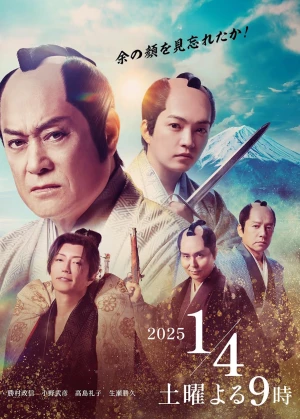
I'll watch anything Miike, but this clearly wasn't for me. It's a TV film based on one of Japan's longest-running TV series, which I'd never heard of before. Without knowing the characters, and not being a big fan of samurai fiction, this was very tough to get into, so be warned if you're giving this a shot. There are some famous names present, but this is very much a project with strong TV roots, meaning it looks cheap and rushed. Keep your expectations low, and there are some decent moments and somewhat memorable scenes. But unless you're a Miike completist or a big fan of the original series, there's no reason to chase this one.Read all

One of Mike's lesser projects. He made a slew of similar Yakuza flicks during the mid-90s, most of them simple straight-to-DVD projects that can be a little tricky to keep apart from each other. Ambition Without Honor is part of a duology, but it could've been a part of any of these franchises just as easily. No surprise then this isn't one of his most memorable films. The plot follows a young Yakuza member who wants to prove his worth and is very eager to quickly rise up in the ranks. He agrees to kill a rival boss and take the legal hit. He spends seven years in prison, but when he finally gets out almost nobody of his old gang remembers him. Cast aside by his family, all he can think of is revenge. This is by far one of Miike's plainest Yakuza films. It's decent enough filler for people who gobble up these types of films by the dozens, but without an enigmatic lead, visual polish or a few surprises tucked away in the overly predictable plot, it's hard to recommend to anyone else. Unless you're a big crime fan or a Miike completist, there's no point in tracking this one down. Read all
Bodyguard Kiba: Combat Apocalypse 2

A lot of incomprehensible English dialogue makes this film much harder to appreciate than necessary. Far from Miike's best work and there is quite a bit of pointless filler, on the other hand the film does feature pretty decent action scenes and some small hints of the craziness that would make him famous. For fans only.

A Miike anthology with a pretty decent cast. This is one of those films that sounded pretty fun on paper, but turned out to be a real drag to watch. I'm not entirely sure how or why this project was set up, but the result is a pretty dull and badly executed mess, where only the third short provides some slivers of entertainment. The three shorts are mostly unrelated, though linked together through the struggle of the Kyushu people from the Kumamoto prefecture. They battle both outside influences, as well as forces that are tearing them away from their homeland. Unless you're really interested in this chapter of Japan's local history, that's not a terribly interesting subject. The bigger problem lies with the execution. The production was spread over multiple years, which explains the difference in quality between the shorts, with the last and latest being the most fun. Actors like Endo, Osugi and Takenaka usually manage to elevate a film like this, but even they look defeated. One of Miike's poorest films, certainly with a runtime that exceeds 120 minutes.Read all

Very cheap, lazy and lifeless sequel. It's another one of those uncharacteristically tame, early Miike films that feels more like a quick directing exercise rather than an actual film. There's some basic Yakuza drama and a pretty violent finale, but that's hardly enough to win over anyone but the most die-hard genre fans. Avoid unless you've seen all the Miike there is to see.

A very early Miike. It's not his first, and I was already familiar with some of his earlier films, so I had a good idea of what to expect. It's fair to say Miike didn't start with a bang, instead he worked himself up and learned the trade by making films. There are already flashes of Miike's genius present, but only if you know where to look. The performances are pretty poor and the film looks dirt cheap, even when it's just over 70 minutes long. There are moments where Miike manages to elevate the film, squeezing in some minor crazy and building up the atmosphere, but they are few are far between. For Miike completists only.Read all

Early days for Takashi Miike. He didn't arrive with a bang, so much is clear. Eyecatch Junction feels like an exercise, a film Miike needed to get used to his directorial role. There are minor shimmers of his genius visible, though hindsight no doubt plays a big part in that. As such, this is mostly a film for people who are interested in Miike's history. The plot is pretty fun and daft, even though the execution isn't. Three female cops feel their male colleagues aren't taking them serious. When they meet for a gym class, they decide to form a little renegade unit. When a case about a missing girl turns up, they see it as an ideal opportunity to show what they're worth. The comedy is pretty silly (nosebleeds and all that), but Miike is very restrained and doesn't take it beyond its manga/anime roots. The performances are weak, the 4:3 video look is an eyesore and the soundtrack is atrocious. This could've been really fun if Miike had made this a decade later, but as it is now, it's really just dull filler and little more than a blip on his road to success. Read all

The first film Miike directed (but the second one to be released). People familiar with Miike's older work will already know to keep their expectations low. While there are glimpses of his directorial style shining through, the film itself is cheap direct-to-video shock that doesn't warrant too much attention, and would've been long forgotten if not for Miike's involvement. The plot revolves around Saeko, a former US commando who returns to Japan in the hope of making a living there. Shortly after her arrival she gets a couple of mercenaries on her tail, who leave no method unexplored to get to Saeko. While her skills get her out of some thorny situations, protecting the people around her proves to be the bigger challenge. A mix of nationalities, some harsher moments that liven up the action scenes and minor details left and right hint at Miike's involvement. Other than that, this is just an ugly 4:3 action flick with poor performances and a complete non-plot. Watch it to discover where it all started for Miike, then forget about it again (which won't be a very hard thing to do). Read all

An anomaly in Miike's oeuvre. It's one of the rare films he directed where nothing much hints at his talent. It's not even one of his earliest works, by then he had already made a couple of future classics. There really isn't any excuse for the poor result, unless you're a true Miike completist I would probably advise against seeking out this film. The plot doesn't make a lot of sense, then again that's not really the film's biggest problem. Jun is the world's strongest Karate fighter. She goes undercover to get to a dominatrix, completely unaware that she herself is being stalked by a hired killer. The closer she gets to her target, the more dangerous her mission becomes. Silver is a relatively short film, which is the only good thing I can say about it. The performances are terrible, the action is bland and the cinematography is a total disgrace. It looks like Miike wanted to be done with this one as quickly as possible, and I wouldn't be surprised if some sort of production issue completely messed up this film. Avoid, unless you want to get in that extra Miike hit.Read all
